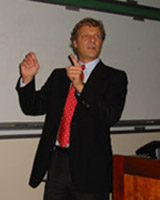 |
Dr. Wolfgang Donsbach. |
German Public Opinion Expert Tells Students, Faculty Research Contributes to Development of Journalism
Journalism is and ought to be "a great intellectual profession," German media scholar Dr. Wolfgang Donsbach told a gathering of University of Georgia students and faculty in October, and to reach that goal journalists need to become aware of empirical research on the practice of and effects of journalism.
For this reason, Dr. Donsbach said, journalism education must introduce students to findings of research on news values, of the importance of pictures in attracting audiences, of the value of good journalism for economic success of the media and on the importance of news framing on how news is perceived.
About 30 students and faculty in the Grady College of Journalism and Mass Communication at the University of Georgia attended the October 16 lecture by the German expert.
The lecture, titled "The Contribution of Communication Research to the Professionalization of Journalism," was organized by the James M. Cox Jr. Center for International Mass Communication Training and Research. The Cox Center is unit of the Grady College.
The event was co-hosted by the Cox Center and the Graduate Caucus, the organization of graduate students in the Grady College.
Dr. Donsbach said that the professional status of journalism has been discussed for 50 years, but the discussion has not produced agreement on the topic.
The problem, he said, is that there is "a lack of evidence-based practice" and "a lack of accountability for effects" of the messages that journalists produce.
 |
Prof. Donsbach and Prof. C. Ann Hollifield, Department of Communication, at the Grady College following his speech. |
What is needed, according to the German scholar, is a list of "best practices" for journalists based on what communication researchers have learned over the years.
This research, he said, looks at the factors that determine what becomes news and what does not, how the values of individual journalists influence news decisions, the importance of photographs, and other such topics.
"Do journalists know that audiences do not always prefer bad news?" Donsbach asked.
Dr. Donsbach is a professor in and founding director of the Department of Communication, Dresden University of Technology. He is co-editor of the International Journal of Public Opinion Research and editor of the forthcoming Blackwell International Encyclopedia of Communication.
Do journalists know that research shows that expenditures for the newsroom have been found by communication researchers to be predictive of increased revenues from advertising and circulation, Dr. Donsbach asked.
Dr. Donsbach reviewed a series of studies in his hour-long session that, in his view, showed the importance of communication research to the practice of journalism and that lay the groundwork for "evidence based practice" and for "accountability" for the effects of journalistic messages.
Dr. Donsbach came to the University of Georgia after visiting the Joan Shorenstein Center on the Press, Politics and Public Policy at Harvard University. Dr. Donsbach has been working with the Harvard Center on comparative research on journalism practice in selected countries.
Dr. Donsbach is past president of the International Communication Association and past president of the World Association for Public Opinion Research. He has published extensively in communication journals in the U.S. and Europe.
Following Dr. Donsbach's presentation, he met with faculty and students in a reception hosted by the Cox Center and the Graduate Caucus.
At the reception, Dr. Donsbach was joined by three broadcast journalists from Germany, who were beginning a one-week stay in the Cox Center.
The German journalists were participating in an exchange program sponsored by the RIAS Commission in Berlin.

